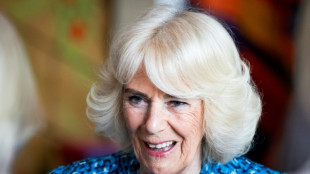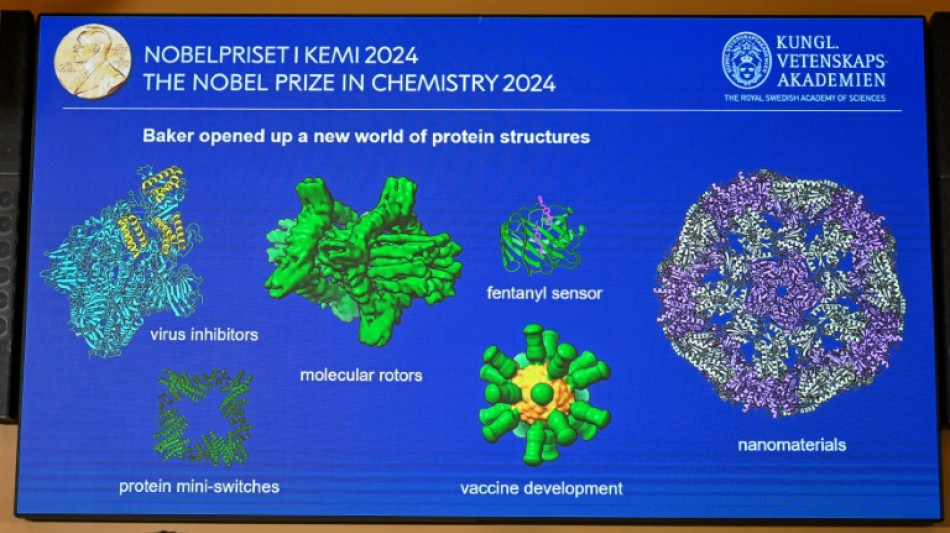
-
 Warhammer maker Games Workshop enters London's top stocks index
Warhammer maker Games Workshop enters London's top stocks index
-
Iran Nobel winner released for three weeks, 'unconditional' freedom urged

-
 Red Cross marks record numbers of humanitarians killed in 2024
Red Cross marks record numbers of humanitarians killed in 2024
-
Johnson's Grand Slam 'no threat', says World Athletics boss Coe

-
 Qatar's emir and UK's Starmer talk trade as state visit ends
Qatar's emir and UK's Starmer talk trade as state visit ends
-
Cuba suffers third nationwide blackout in two months

-
 Russia, Ukraine to send top diplomats to OSCE summit in Malta
Russia, Ukraine to send top diplomats to OSCE summit in Malta
-
Spanish royals to attend memorial service for flood victims

-
 LPGA, USGA new policy requires female at birth or pre-puberty change
LPGA, USGA new policy requires female at birth or pre-puberty change
-
Stick to current climate change laws, US tells top UN court

-
 British Museum chief says Marbles deal with Greece 'some distance' away
British Museum chief says Marbles deal with Greece 'some distance' away
-
Pope Francis receives electric popemobile from Mercedes

-
 Gaza civil defence: thousands flee Israeli strikes, evacuation calls
Gaza civil defence: thousands flee Israeli strikes, evacuation calls
-
Trump names billionaire private astronaut as next NASA chief

-
 Pidcock to leave INEOS Grenadiers at end of season
Pidcock to leave INEOS Grenadiers at end of season
-
Seoul stocks weaken, Paris advances despite political turmoil

-
 South America summit hopes to seal 'historic' trade deal with EU
South America summit hopes to seal 'historic' trade deal with EU
-
DAZN awarded global TV rights for Club World Cup

-
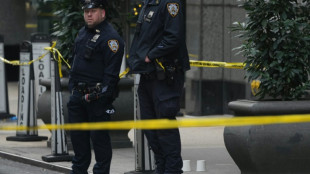 Top executive shot dead outside New York hotel
Top executive shot dead outside New York hotel
-
Vaping while still smoking unlikely to help quitters: study
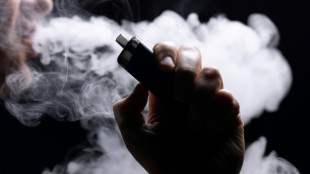
-
 British Museum chief says Parthenon Marbles deal with Greece 'some distance' away
British Museum chief says Parthenon Marbles deal with Greece 'some distance' away
-
'Creating connections': Arab, African filmmakers gather at Morocco workshops
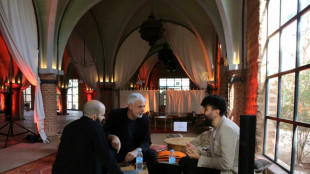
-
 Iran frees Nobel winner for three weeks, sparking calls for 'permanent' release
Iran frees Nobel winner for three weeks, sparking calls for 'permanent' release
-
Brazil's Minas cheese gets added to UNESCO list

-
 Top US executive shot dead in New York City: media
Top US executive shot dead in New York City: media
-
Trump's nominee to run Pentagon hangs by a thread

-
 GM announces more than $5 bn hit to earnings in China venture
GM announces more than $5 bn hit to earnings in China venture
-
World chess champ Ding, teen challenger tied past halfway mark

-
 Georgia police raid opposition offices as PM vows to curb protests
Georgia police raid opposition offices as PM vows to curb protests
-
S. Korea opposition begins push to impeach president

-
 Syrian army fights rebel offensive with counterattack
Syrian army fights rebel offensive with counterattack
-
France court upholds Polanski acquittal in defamation case
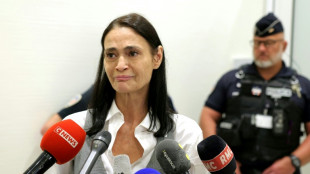
-
 UK bans daytime TV ads for cereals, muffins and burgers
UK bans daytime TV ads for cereals, muffins and burgers
-
Palace's Guehi to face no formal action over 'Jesus' message on rainbow armband

-
 UK faces trade balancing act with Trump, EU
UK faces trade balancing act with Trump, EU
-
Iran releases Nobel Peace laureate Mohammadi on medical leave: lawyer

-
 UNESCO grants heritage status to Aleppo soap as Syria war flares
UNESCO grants heritage status to Aleppo soap as Syria war flares
-
Ghana's illegal mining boom seeps into presidential election

-
 Inconsistent Spurs 'progressing in all aspects': Postecoglou
Inconsistent Spurs 'progressing in all aspects': Postecoglou
-
France's Orano says Niger junta controls uranium firm

-
 Seoul stocks weaken, Paris edges up tracking political turmoil
Seoul stocks weaken, Paris edges up tracking political turmoil
-
China reports warmest autumn since records began
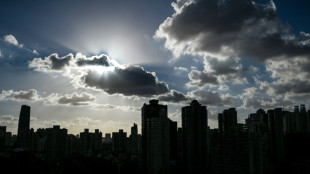
-
 French marine park to close over law banning killer whale shows
French marine park to close over law banning killer whale shows
-
Thousands march demanding S. Korea president resign over martial law debacle

-
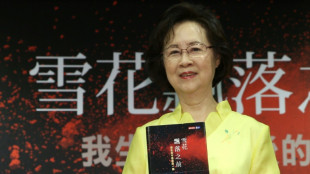 Taiwan romance novelist Chiung Yao dies at 86
Taiwan romance novelist Chiung Yao dies at 86
-
In Angola, Biden promises to invest differently to China

-
 Syrian army launches counteroffensive against rebels
Syrian army launches counteroffensive against rebels
-
Evenepoel says 'long journey' ahead after postal van collision

-
 South Korea's day of rage as Yoon's martial law founders
South Korea's day of rage as Yoon's martial law founders
-
UK police question killer nurse Letby over further baby deaths

| RIO | -0.16% | 63.41 | $ | |
| BTI | 0.44% | 37.194 | $ | |
| BP | -1.06% | 29.141 | $ | |
| CMSC | 0.15% | 24.596 | $ | |
| NGG | -1.14% | 62.26 | $ | |
| GSK | -1.06% | 34.535 | $ | |
| CMSD | 0.45% | 24.42 | $ | |
| SCS | -0.9% | 13.4 | $ | |
| RYCEF | 1.46% | 7.55 | $ | |
| AZN | -2.02% | 66.705 | $ | |
| BCC | -0.53% | 145.665 | $ | |
| JRI | -0.89% | 13.42 | $ | |
| BCE | -1.83% | 26.82 | $ | |
| VOD | -0.28% | 8.805 | $ | |
| RBGPF | -1.64% | 61 | $ | |
| RELX | 0.91% | 47.915 | $ |

What are proteins again? Nobel-winning chemistry explained
The Nobel Prize in Chemistry was awarded on Wednesday to three scientists who have help unravel some of the enduring secrets of proteins, the building blocks of life.
While Demis Hassabis and John Jumper of Google's DeepMind lab used artificial intelligence techniques to predict the structure of proteins, biochemist David Baker managed to design totally new ones never seen in nature.
These breakthroughs are hoped to lead towards numerous advances, from discovering new drugs to enzymes that decompose pollutants.
Here is an explainer about the science behind the Nobel win.
- What are proteins? -
Proteins are molecules that serve as "the factories of everything that happens in our body," Davide Calebiro, a protein researcher at the UK's University of Birmingham, told AFP.
DNA provides the blueprint for every cell. Proteins then use this information to do the work of turning that cell into something specific -- such as a brain cell or a muscle cell.
Proteins are made up of 20 different kinds of amino acid. The sequence that these acids start out in determines what 3D structure they will twist and fold into.
American Chemical Society president Mary Carroll compared how this works to an old-fashioned telephone cord.
"So you could stretch out that telephone cord, and then you would just have a one-dimensional structure," she told AFP.
"Then it would spring back" into the 3D shape, she added.
So if chemists wanted to master proteins, they needed to understand how the 2D sequences turned into these 3D structures.
"Nature already provides tens of thousands of different proteins, but sometimes we want them to do something they do not yet know how to do," said French biochemist Sophie Sacquin-Mora.
- What did AI do? -
The work of previous Nobel winners had demonstrated that chemists should be able to look at amino acid sequences and predict the structure they would become.
But it was not so easy. Chemists struggled for 50 years -- there was even a biannual competition called the "Protein Olympics" where many failed the prediction test.
Enter Hassabis and Jumper. They trained their artificial intelligence model AlphaFold on all the known amino acid sequences and corresponding structures.
When given an unknown sequence, AlphaFold compares it with previous ones, gradually reconstructing the puzzle in three dimensions.
After the newer generation AlphaFold2 crushed the 2020 Protein Olympics, the organisers deemed the problem solved.
The model has now predicted the structure of almost all of the 200 million proteins known on Earth.
- What about the new proteins? -
US biochemist Baker started at the opposite end of the process.
First, he designed an entirely new protein structure never seen in nature.
Then, using a computer programme called Rosetta that he had developed, he was able to work out the amino acid sequence that it started out as.
To achieve this, Rosetta trawled through all the known protein structures, searching for short protein fragments similar to the structure it wanted to build.
Rosetta then tweaked them and proposed a sequence that could end up as the structure.
- What is all this for? -
Mastering such fundamental and important little machines as proteins could have a vast number of potential uses in the future.
"It allows us to better understand how life functions, including why some diseases develop, how antibiotic resistance occurs or why some microbes can decompose plastic," the Nobel website said.
Making all-new proteins could lead to new nanomaterials, targeted drugs and vaccines, or more climate-friendly chemicals, it added.
Asked to pick a favourite protein, Baker pointed to one he "designed during the pandemic that protects against the coronavirus".
Calebiro emphasised how "transformative" this research would be.
"I think this is just the beginning of a completely new era."
C.Kovalenko--BTB


